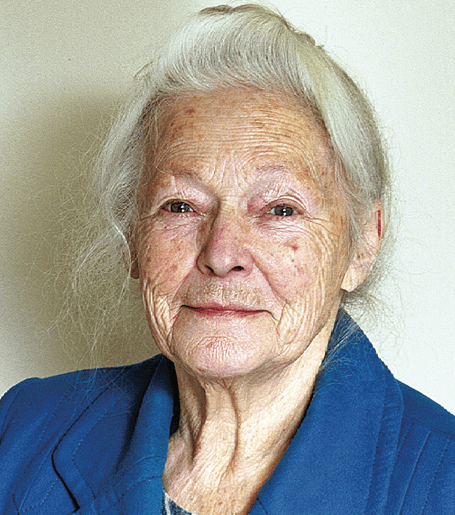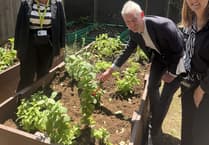A bit of a carry on
The remarkable untold story of Carry On actor Peter Butterworth and his wife, Britain’s first female TV impressionist Janet Brown, is revealed by someone who knows much about the subject. Tyler Butterworth reveals the private story behind his parents’ public lives in a forthcoming lecture to The Arts Society Mayford (TASM).
It is a journey that takes in MI9, the building of a theatre in the notorious Second World War prisoner of war camp Stalag Luft III, nights at Chequers with a Prime Minister, This is Your Life and many more moments in their long, shared life in the theatre.
Coincidentally, the Stalag Luft III part of Peter’s life is highlighted in the current Great Escapes exhibition, showing at The National Archives, Richmond, Surrey, until July 21. He was incarcerated alongside his future screenwriter Talbot Rothwell and their entertaining of fellow prisoners hid the sounds of tunnel digging.
Tyler grew up in a theatrical family and spent 25 years as an actor working extensively in film, television, theatre and radio. He then worked as a development producer in television documentaries and was closely involved with NASA on a landmark commemorative TV series. Now, he works as a voice actor, recording audiobooks, documentaries and voiceovers.
He produces walking audio guides to cities across Europe for private clients on whatever subject he is commissioned to do. They are just like the audio guides you get in art galleries and museums but they are out on the street. He lives in Sussex where he walks on the South Downs and the South Coast.
The lecture is on March 14, 2024 at 10.30am at the Welcome Church, 1-5 Church Street West, Woking, GU21 6DJ. Lectures are free for TASM members, but cost £10 for non-members. Anyone wishing to visit should contact Richard Brace on 01932 344305 or at [email protected]
The loo is skipped!
Yes, WBC is set to close the public loos. Of course, the nursery rhyme about Skipping to my Lou has nothing to do with public conveniences and Lou, in that case, comes from the Scottish for love. But it was irresistible as a heading to this rather serious news.
I must register an interest in loos as I am, by marriage and several generations, related to Sir John Harington who invented the first flushing toilet in 1596.
He was so chuffed with his ‘water closet’ – flushed with pride one might assume – that although he kept one example at his own home he presented his godmother, Queen Elizabeth I, with another. An interesting choice of present, I think, especially as it might be said his godmother had a very adequate throne already.
There is an example on show at the Science Museum. I do wish he had first invented the Patent Office so he could have collected on all of those people sending a penny to make use of various versions of his original invention.
Perhaps surprisingly, paying for the use of a convenience is nothing new. In fact it is very old. Back to the time of Vespasian, evidently, who used the charge as a way of raising money. An example of What the Romans Did for Us?
The provision of a public loo was obviously a sign of civilisation back then. I suppose that these days such payments will be made by waving a bank card over a card reader – very hygienic, of course, but some way up from the old penny in the slot.
Might I suggest that it is sexist to close public conveniences? It has always been somewhat easier for males to relieve themselves discreetly. Although many will do it indiscreetly – and unhygienically. And expensively, for I read that “urinating in the countryside is littering, as a council insisted as it fined two men for the offence.” (Daily Telegraph, January 30, 2024).
Evidentially the Environmental Protection Act of 1990 makes no mention of urine. But does it list every single item which could be inappropriately deposited as litter? An apple core which the soil will consume? Or is that litter until the consuming is done, by which time it has become compost?
Is the pee-fining borough in question merely living up to its name: Dacorum? The name was recorded back in 1196 so at some time in its decorous history it was likely spelt with an ‘e’ instead of an ‘a’?
I fear this inconvenience may be spreading faster than WCs are closing for both Richmond and Bedford are considering such action to be a littering offence, and Lambeth council goes as far as to issue fixed penalty notices for such behaviour: priced at £150, or £100 if paid within ten days.
So perhaps WBC – not exactly flush with cash – will think on this as an alternative way to get considerably more than mere pennies.
This is even a problem in the highest places. I am not speaking of royalty, for they have been furnished with WCs since my ancestor’s gift. Higher still: Everest, in fact. Between Camp One, at the base, and Camp Four, towards the summit, there is estimated to be around three tons of human excrement – this is according to Sagarmatha Pollution Control Committee.
In some cases climbers have left their waste in plastic bags – presumably in the belief that there is a Himalayan version of the British Poo Fairy who will come and remove the gifts. Not only is there no such deity, but the cold does no allow for the waste to biodegrade. Climbers are to be supplied with WAG Bags – Waste Alleviation & Gelling – containing chemicals to solidify the waste and render it largely odourless.
The idea being that these bags will be supplied to climbers: counted out, and counted back, in order to clean up Everest (Daily Telegraph, February 9, 2024).
Some time back, I wrote of a glowing report on the public convenience in Wolsey Place. I was privy to the news that these well-rated loos are not under the jurisdiction of WBC. So limit your shopping to the area nearest to that convenient convenience.
Remember, WBC – Women and Children (and the elderly and disabled), first – they cannot all repair to the greenwood in answer to calls of nature – and hope to avoid observation as they do so. A plea to the council: if not a U-turn an S-bend in its financial thinking is called for.
On the other side
The phrase “see you on the other side” is usually taken to mean that death will not divide the two speakers – referring to belief in an afterlife. With the Brookwood Cemetery Society it could be taken in an entirely different way – “see you on the other side of Cemetery Pales”. That is the road which divides Brookwood Cemetery North from Brookwood Cemetery South and the society is about to start up the season of regular walks which it organises around this beautiful place.
Three such walks will take place on Sunday (March 3, 2024) at 2pm. The first will be an Introductory Walk on the North Side, led by Barry Devonshire who will take a group to explorable the former non-conformist section which has burials from many different beliefs and from diverse backgrounds and had one of the two railway stations within the cemetery.
Meanwhile, on the other side Jon Leach will lead a General Walk on the South Side to introduce that group to the beauty of the area, interesting monuments, and people who chose Brookwood as their final resting place – you must forgive them for not getting up to welcome you! Probably better that way. This area has the unique feature of the railway funerals.
On the same day, and at the same time, Symbolism North Side is the title of the walk led by Alison Vince. She will talk about the meanings of some of the wonderful designs on he many varied headstones in the North Cemetery.
Booking is essential and may be done by email – [email protected] or mobile 07714 289375. A donation of £6.50 per person is requested and this includes refreshments afterwards at the Lodge by the Glades entrance from Cemetery Pales, which is also the meeting place for the start of the walks.
On receipt of booking, a place on the walk of choice will be confirmed as group sizes need to be organised so all may hear the speakers. Yes, the donation has gone up as from the society’s last AGM but the money goes towards the restoration of this wonderful place. And, as all who have joined the walks previously know, the refreshments are good, too.
Change
Sometimes I need to go into Woking. Or even to cross to the other side. On such journeys, by foot, I try to work out an interesting route. So that I may, for instance, check on the up-to-now defunct drinking water points in the town. They are still dry.
I noticed the giant Lego-like pieces have been moved from Church Street East. Not taken away, just moved. Currently the only piece of road thus blocked off is outside Cleary Court. Surely this is nothing to do with the 11-storey block we have been threatened with for that site? Even if it is billed as being a ‘beacon of sustainable construction’ – a boast which means nothing to me. I had a good look at the 1980s building. It is certainly not unattractive, and is of interesting red brick: no cladding. Another case of pulling something decent down to put something boring up?
I am still amazed that anyone who keenly names places in the town so the word Victoria is incorporated, should wish to tear down anything which is/was genuinely Victorian. No: Cleary Court most certainly is not Victorian, but it is not without merit as a building.
I wonder what will happen to the redundant ‘Lego’ pieces. Stored at some council depot doubtless. They could be put to some fun use by moving them to one of the closed playgrounds – would Health and Safety not permit the joys of mountaineer and den-making with them?
I needed a loaf of bread. Just the one item. I went to Sainsbury’s in Woking Centre. Shock! Horror! Not a proper till in sight! All those beastly do-it-yourself thingies.
I asked a very human lady if there were any humans who would take my cash – note that , cash – in return for a loaf. She said she would. And led me to one of the thingies and duly put my money in and presented me with the loaf.
A very pleasant lady, but I told her I would not be shopping there again: no gentle chat at the till, no one asking if I have a Nectar card, no one asking if I need a hand, no one to wish me a good day.
There is, as my lady pointed out, a real till in the tobacco and vape section. Not for me!
Luckily such shopping is usually performed by my daughter, on her way back from work, at Sainsbury’s in Brookwood where, I am assured, there are some real people at some real tills. For how much longer, I wonder?
Just wait, supermarkets, until the next electricity outage and everything closes down till-wise. Even those horrid thingies.
I shall take my cash to a shop where they understand cash. Still. And may even enquire about my health and comment on the state of the weather. Human beings.





Comments
This article has no comments yet. Be the first to leave a comment.